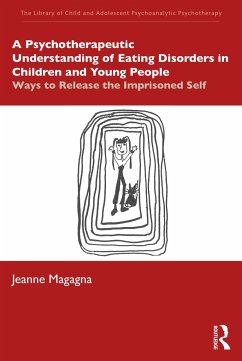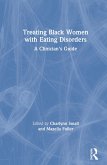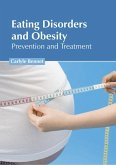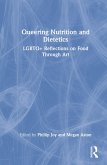This important book shows how psychotherapy can address severe eating disorders in children and young people, illustrating the ways an imprisoned self can be released from suffering.
The book features a range of case studies while addressing core issues such as self-harm, hallucinations and the threat of suicide, as well as related topics such as depression and psychosis. Illustrating the psychological roots to eating disorders, it places therapy within hospital, clinical and multi-disciplinary contexts, as well as displaying how psychoanalytic theory can be applied across various settings and in different teams.
Written by an eminent author in the field, this will be a key text for anyone wishing to understand eating disorders in children from a psychotherapeutic and psychoanalytic dimension.
The book features a range of case studies while addressing core issues such as self-harm, hallucinations and the threat of suicide, as well as related topics such as depression and psychosis. Illustrating the psychological roots to eating disorders, it places therapy within hospital, clinical and multi-disciplinary contexts, as well as displaying how psychoanalytic theory can be applied across various settings and in different teams.
Written by an eminent author in the field, this will be a key text for anyone wishing to understand eating disorders in children from a psychotherapeutic and psychoanalytic dimension.
"Jeanne Magagna displays a rare combination of psychoanalytic rigour firmly based in infant observation, combined with a deep knowledge and experience of working with other modalities and disciplines, in order to understand and treat the complexity of children and adolescents with eating disorders and their families. Her compassion for the young people's suffering shines through in the many case examples, showing the therapeutic perseverance needed as well as a strong belief in the rightful need of these children for a container to process their emotional experiences sometimes for the first time. She emphasises the early infantile and primitive anxieties at the core of these children's suffering. She shows the resources needed to help these children and their families to bear these anxieties. This valuable book is for professionals working with this client group as well as with the parents who suffer the torments of living with such an unforgiving illness."
Ricky Emanuel B.Sc. M.Sc. MACP MBPC, Consultant Child, Adolescent and Adult Psychotherapist, Teacher and Supervisor - Tavistock Clinic London, Birmingham Trust for Psychoanalytic Psychotherapy, Centro Studi Martha Harris, Florence
"With her wealth of experience as a practitioner and a teacher Jeanne Magagna deals with difficult patients who are prone to self-harm and suicide. Her innate ability to connect to them and their parents with kindness, gentleness and clear thought frees the anorectic young person's vulnerable self. Her honest and open clinical accounts go beyond recognizing the patient's projections to being genuinely affected by them, and then working through her own counter transference experiences. The most satisfactory therapeutic outcome is achieved when parents are helped through parents' groups, couple therapy and family therapy to work with the children to repair broken connections. A worldwide must-read for professionals, parents and young people, particularly those concerned about eating disorders."
Micky Bhatia, Child Analyst and Training and Supervisory Analyst, Indian Psychoanalytical Society
"What happens when the relationship to the internalised parents is too conflictual and anxieties cannot be contained emotionally? At some point, either during childhood or adolescence, severe eating disorder may appear, along with the threat of death. Jeanne Magagna brings us close to this complex and desolate emotional territory, plagued with nightmares, feelings of persecution, and degrees of retreats so severe that language fails. She describes her clinical approach in detail, based on the establishment of a sensitive individual therapeutic relationship, the analysis of transference and countertransference, and belief in the beauty and goodness of the mother, her mind, her body, and her interiority. By building a container for those primitive terrors which were never contained, and enhancing the containing function of the parents, the multidisciplinary team arrives at emotional understanding and recovery of the children and their families. Beautiful task, beautiful book."
Mónica Cardenal, Training Analyst, Psychoanalytic Association of Buenos Aires. COCAP IPA, Child and Adolescent Psychoanalysis Committee Co-Chair Latin America. Supervisor in the Early Childhood Area and Director of Infant Observation post graduate Course, according to Mrs. Bick's method, Tavistock Clinic model, Pediatric Mental Health Service, Italian Hospital. Co-editor with Jeanne Magagna of Revista Internacional de Observación de bebés, Gradiva, Peru (2018)
"This important book flows from many years of experience, written by one of the leading psychotherapists in the field of eating disorders. Magagna's extensive knowledge, her compassion and insightful wisdom are woven throughout its pages. She guides the reader though the work of communicating with distressed young people and exploring their emotional experience and the nature of our relationships and interactions with them, always focussed on enhancing therapeutic understanding. Numerous clinical examples bring these themes to life and will resonate with anyone working with young people with eating disorders. The writing is open, honest and reflective throughout.
This text will appeal to all therapists - irrespective of training, professional discipline, or theoretical persuasion - interested in opening their minds, and seeking to improve their own understanding of the young people with whom they work. In this way Magagna indeed allows the door to be opened a little wider for countless emotionally imprisoned young people to be able to take those vital steps forward towards release."
Rachel Bryant-Waugh, BSc, MSc, DPhil, FAED, Consultant Clinical Psychologist and Lead Clinician ARFID Service, Maudsley Centre for Child and Adolescent Eating Disorder, London, UK
"Jeanne Magagna shares with us her many years' expertise in working with young people who suffer severely, and with the families and the caretakers committed to helping them decide to live. Jeanne emphasizes the therapist's empathy in bearing their hatred, disregard, being closed out from children who cannot trust, who are depressed, suicidal, in a claustrum, catatonic or suffering hallucinations. With detailed, close-in clinical examples, Jeanne shows how she works in the countertransference as a way to understand her patients' suffering. Read the book from beginning to end! You will feel fortified to move forward in your own work. You will be moved! Jeanne's closing remarks about her own emotional growth in working with these children will leave you teary-eyed and grateful."
Nancy Bakalar, MD, FABP, Supervising Analyst, IIPT, Chevy Chase, MD and Faculty, Denver Institute for Psychoanalysis, Denver, Colorado
"Reading Magagna's book on releasing the imprisoned self is like sitting in a library with an old friend, taking you on a journey from the very earliest stages of development of the child's mind, describing various ways in which this can go off course and develop into one form of an eating disorder or another. Interweaving rich observational and clinical material with theoretical illuminations drawn from the writings of leading psychoanalytic minds, Jeanne Magagna breathes meaning and hope into the therapist's mind to deal with young people who are often terribly hard to reach and help.
This publication offers a treasure trove of compassionate insights into the minds of people with eating disorders, particularly those with anorexia nervosa. The insights will resonate with and illuminate not only the clinician familiar with psychoanalytic ways of working, but all clinicians dealing with young people with eating disorders and their families, addressing common challenges that make these conditions some of the most difficult to treat."
Jeremy Freeman, Clinical Psychologist, Psychoanalytic Psychotherapist and Development Director, Australia & New Zealand Academy for Eating Disorders
Ricky Emanuel B.Sc. M.Sc. MACP MBPC, Consultant Child, Adolescent and Adult Psychotherapist, Teacher and Supervisor - Tavistock Clinic London, Birmingham Trust for Psychoanalytic Psychotherapy, Centro Studi Martha Harris, Florence
"With her wealth of experience as a practitioner and a teacher Jeanne Magagna deals with difficult patients who are prone to self-harm and suicide. Her innate ability to connect to them and their parents with kindness, gentleness and clear thought frees the anorectic young person's vulnerable self. Her honest and open clinical accounts go beyond recognizing the patient's projections to being genuinely affected by them, and then working through her own counter transference experiences. The most satisfactory therapeutic outcome is achieved when parents are helped through parents' groups, couple therapy and family therapy to work with the children to repair broken connections. A worldwide must-read for professionals, parents and young people, particularly those concerned about eating disorders."
Micky Bhatia, Child Analyst and Training and Supervisory Analyst, Indian Psychoanalytical Society
"What happens when the relationship to the internalised parents is too conflictual and anxieties cannot be contained emotionally? At some point, either during childhood or adolescence, severe eating disorder may appear, along with the threat of death. Jeanne Magagna brings us close to this complex and desolate emotional territory, plagued with nightmares, feelings of persecution, and degrees of retreats so severe that language fails. She describes her clinical approach in detail, based on the establishment of a sensitive individual therapeutic relationship, the analysis of transference and countertransference, and belief in the beauty and goodness of the mother, her mind, her body, and her interiority. By building a container for those primitive terrors which were never contained, and enhancing the containing function of the parents, the multidisciplinary team arrives at emotional understanding and recovery of the children and their families. Beautiful task, beautiful book."
Mónica Cardenal, Training Analyst, Psychoanalytic Association of Buenos Aires. COCAP IPA, Child and Adolescent Psychoanalysis Committee Co-Chair Latin America. Supervisor in the Early Childhood Area and Director of Infant Observation post graduate Course, according to Mrs. Bick's method, Tavistock Clinic model, Pediatric Mental Health Service, Italian Hospital. Co-editor with Jeanne Magagna of Revista Internacional de Observación de bebés, Gradiva, Peru (2018)
"This important book flows from many years of experience, written by one of the leading psychotherapists in the field of eating disorders. Magagna's extensive knowledge, her compassion and insightful wisdom are woven throughout its pages. She guides the reader though the work of communicating with distressed young people and exploring their emotional experience and the nature of our relationships and interactions with them, always focussed on enhancing therapeutic understanding. Numerous clinical examples bring these themes to life and will resonate with anyone working with young people with eating disorders. The writing is open, honest and reflective throughout.
This text will appeal to all therapists - irrespective of training, professional discipline, or theoretical persuasion - interested in opening their minds, and seeking to improve their own understanding of the young people with whom they work. In this way Magagna indeed allows the door to be opened a little wider for countless emotionally imprisoned young people to be able to take those vital steps forward towards release."
Rachel Bryant-Waugh, BSc, MSc, DPhil, FAED, Consultant Clinical Psychologist and Lead Clinician ARFID Service, Maudsley Centre for Child and Adolescent Eating Disorder, London, UK
"Jeanne Magagna shares with us her many years' expertise in working with young people who suffer severely, and with the families and the caretakers committed to helping them decide to live. Jeanne emphasizes the therapist's empathy in bearing their hatred, disregard, being closed out from children who cannot trust, who are depressed, suicidal, in a claustrum, catatonic or suffering hallucinations. With detailed, close-in clinical examples, Jeanne shows how she works in the countertransference as a way to understand her patients' suffering. Read the book from beginning to end! You will feel fortified to move forward in your own work. You will be moved! Jeanne's closing remarks about her own emotional growth in working with these children will leave you teary-eyed and grateful."
Nancy Bakalar, MD, FABP, Supervising Analyst, IIPT, Chevy Chase, MD and Faculty, Denver Institute for Psychoanalysis, Denver, Colorado
"Reading Magagna's book on releasing the imprisoned self is like sitting in a library with an old friend, taking you on a journey from the very earliest stages of development of the child's mind, describing various ways in which this can go off course and develop into one form of an eating disorder or another. Interweaving rich observational and clinical material with theoretical illuminations drawn from the writings of leading psychoanalytic minds, Jeanne Magagna breathes meaning and hope into the therapist's mind to deal with young people who are often terribly hard to reach and help.
This publication offers a treasure trove of compassionate insights into the minds of people with eating disorders, particularly those with anorexia nervosa. The insights will resonate with and illuminate not only the clinician familiar with psychoanalytic ways of working, but all clinicians dealing with young people with eating disorders and their families, addressing common challenges that make these conditions some of the most difficult to treat."
Jeremy Freeman, Clinical Psychologist, Psychoanalytic Psychotherapist and Development Director, Australia & New Zealand Academy for Eating Disorders








